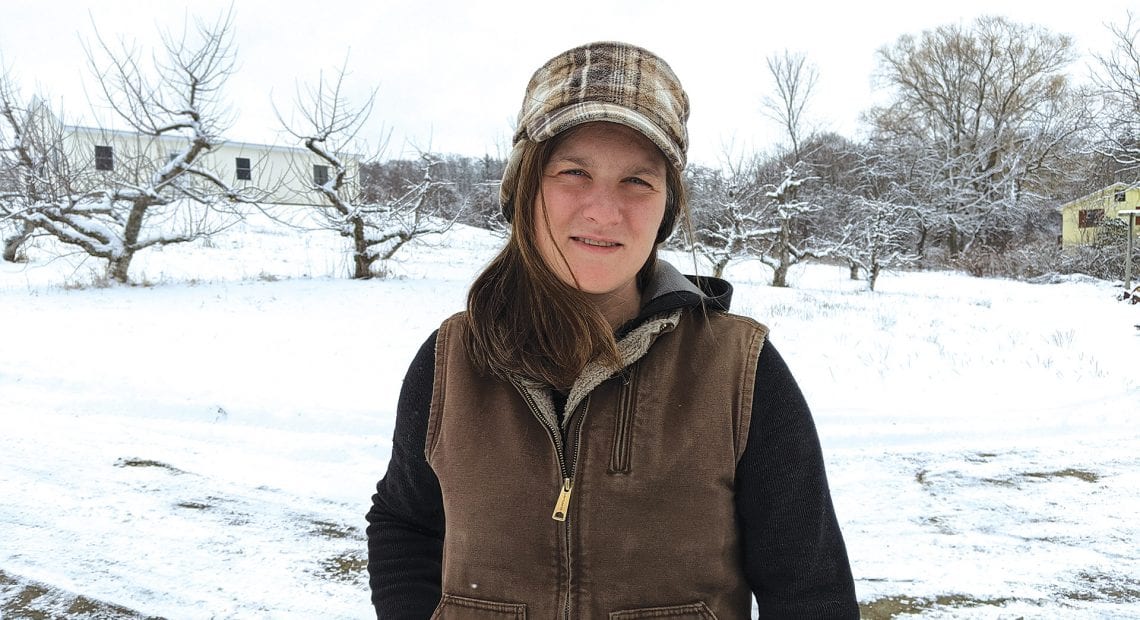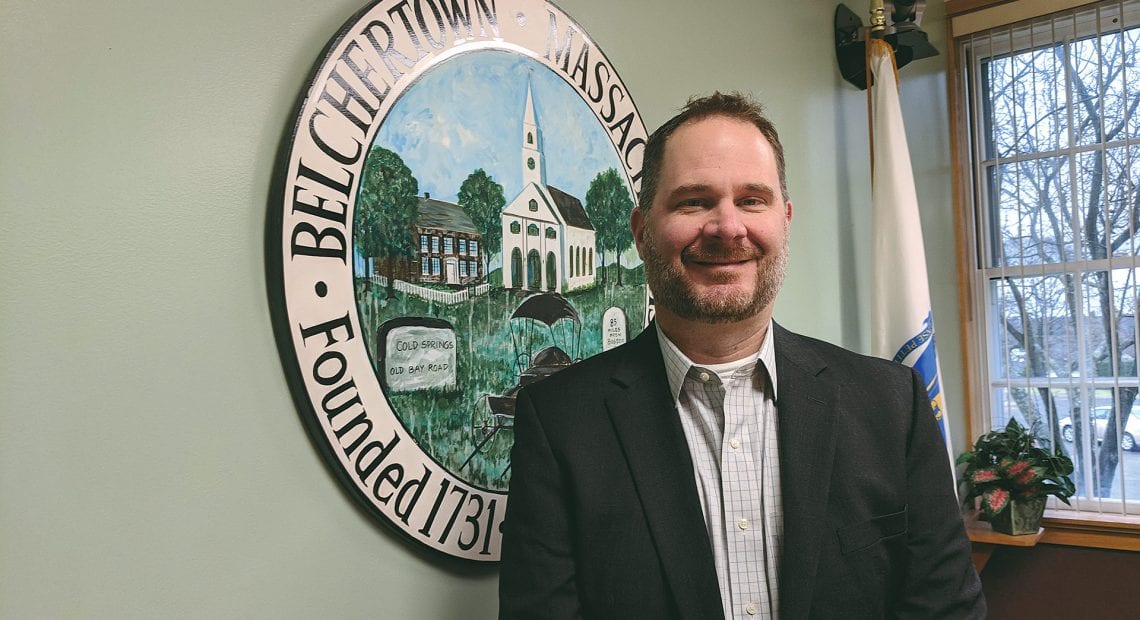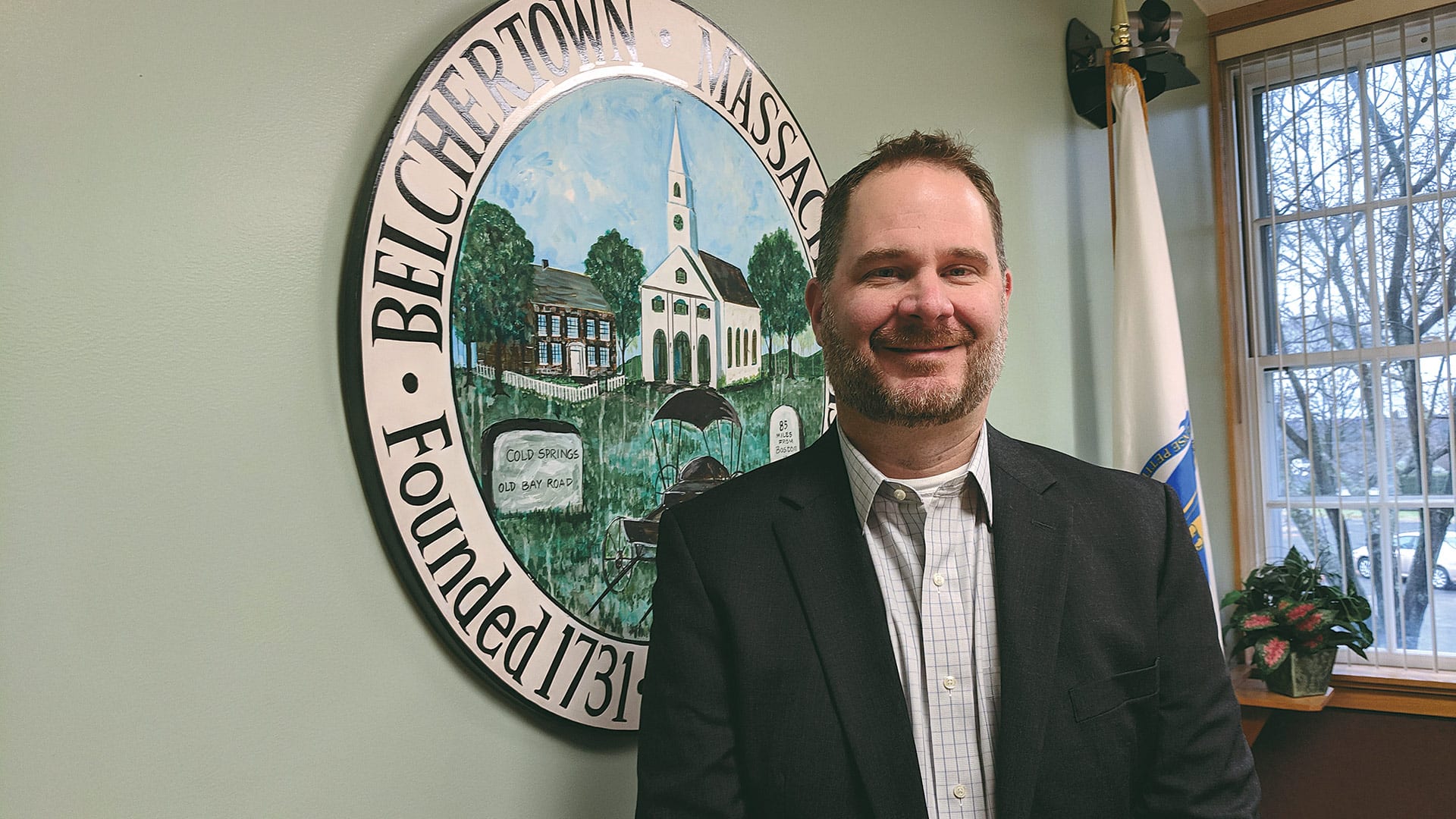Growth Market
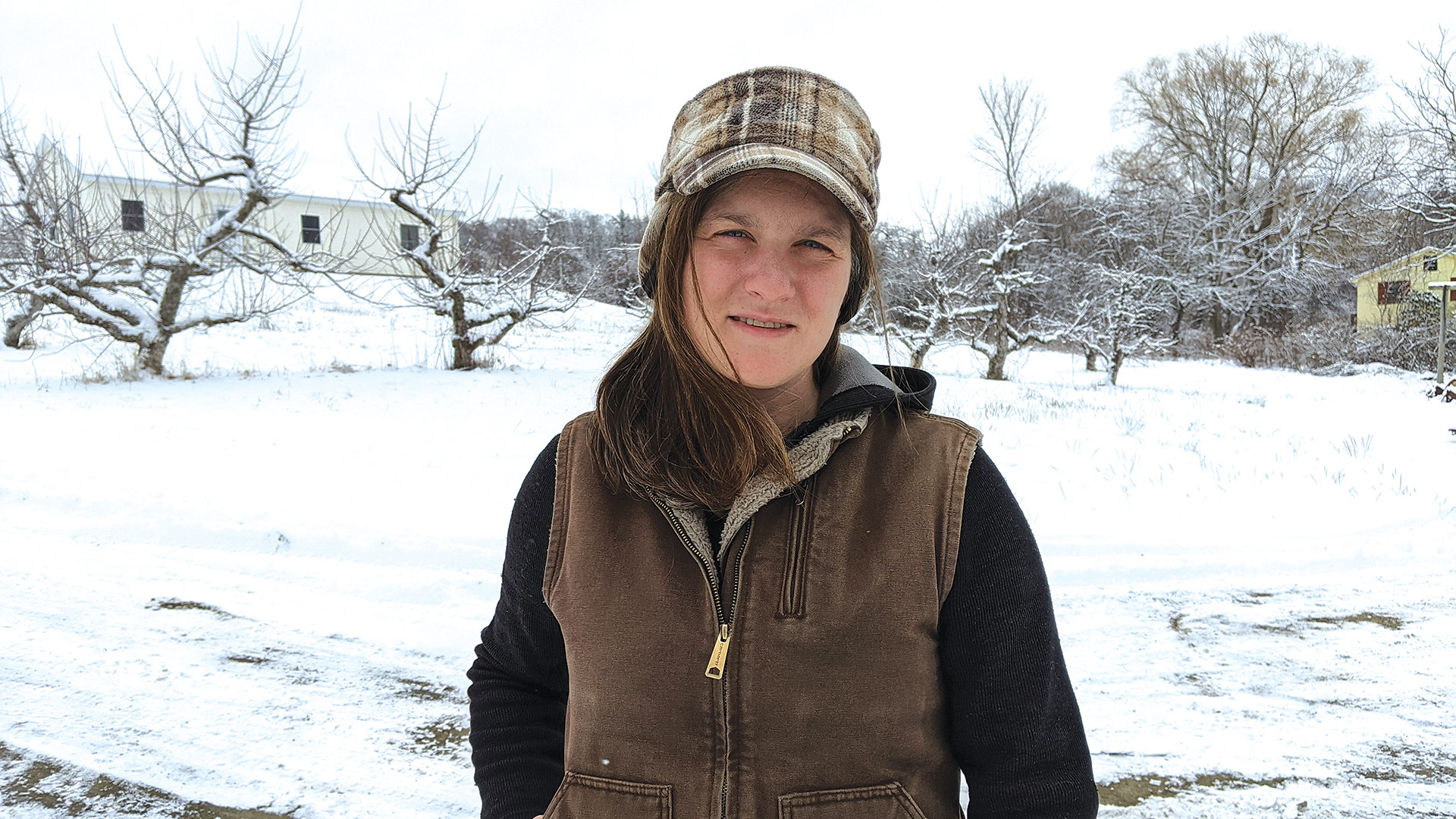
Elly Vaughan with some of the trees that will blossom with life — and fruit — when the weather warms up.
Elly Vaughan knows a lot about the global food system — and the myriad problems it has posed over the decades.
“Local food is so important for so many reasons,” she said. “The global food system has a lot of issues — environmental issues, workers’ human-rights violations, the way the global agricultural food system tends to strip people of their water rights in some countries.
“Globalized food — a large, centralized food system — can really damage the environment and communities, and when we buy local, we break that cycle,” she added. And, as owner of Phoenix Fruit Farm in Belchertown, she’s certainly doing her part.
“We’re delivering money directly from the consumer to the farmer, so that eliminates the middleman — the consumer gets a fresher product, and the farmer gets a better price point,” she said. “The farmer can pay their workers living wages and can be conservative about environmental resources, which affects climate change, while offering affordable, high-quality food to local communities and families. That’s what a local food system does.”
Taking notice of how Vaughan has grown and diversified Phoenix since purchasing the property in 2017, the Amherst Area Chamber of Commerce gave her the Leader in Innovation Award at its 2020 A+ Awards, “for being instrumental in cultivating relationships with other local businesses to improve the economic climate of Belchertown.”
That’s gratifying for someone whose business motto is “fruit with a conscience.”
“Small farms are disappearing all the time in this country — it’s been a perennial struggle for the last 30 or 40 years,” she told BusinessWest. “You keep seeing more and more small farms going out of business as they succumb to the pressures of trying to compete with large agribusinesses that are the worst offenders in terms of environmental damage and pollinator collapse and workers’-rights violations.
“But I think that local food is a model for an alternative to that,” she went on. “Producing food and feeding people doesn’t like to look like this. It does not have to be actively harming the environment; it does not have to be actively exploiting workers and excluding low-income families from being able to afford healthy food. Small farms don’t have to struggle to compete in a wholesale marketplace when they can deliver directly to their community.”
Community Focus
Vaughan became interested in farming as a career while in college, and she worked on various organic vegetable farms for about a decade before becoming the orchard manager for Phoenix, which was then owned and operated by Amherst-based Atkins Farms.
When Atkins decided to sell the Belchertown property, Vaughan bought it, and renovated the 1935 horse barn on the property as her residence.
“When I first bought it, it was apples and peaches — and those are still my largest crops,” she said. “But I have replanted and started diversifying.”
New crops include more varieties of apples, as well as table grapes, strawberries, and other fruits. In 2018, she planted new blocks of peach, nectarine, and pear trees, and she’ll see the first harvest of peaches and nectarines from those trees this spring, with the pears coming along in subsequent years. She’s also begun planting more vegetables, including asparagus, tomatoes, kale, onions, and basil. “I want to ramp all that up, now that I have a store and an outlet for a diverse market garden.”
The nearby store on Route 181 was a dilapidated garage with no foundation, plumbing, or … well, much else, actually, when she decided to turn it into a country store.
“Small farms are disappearing all the time in this country — it’s been a perennial struggle for the last 30 or 40 years. You keep seeing more and more small farms going out of business as they succumb to the pressures of trying to compete with large agribusinesses that are the worst offenders in terms of environmental damage and pollinator collapse and workers’-rights violations.”
“It was just a shell of a garage,” Vaughan said. “It was a major, major undertaking to get it to where it is now. But it’s really starting to catch on, I think.”
Since opening in July 2019, the store sells locally produced fruits and vegetables, meats, dairy, eggs, bread, baked goods, and coffee, as well as prepared foods, like grab-and-go wraps, side dishes and soups to heat up at home, and plenty of pantry staples. “You can grab everything you need to make a meal for your family in the store.”
That’s been a plus for patrons who don’t want to go in supermarkets these days; in response to COVID-19 anxieties, the store launched curbside pickup last year and expanded its product lines — with items like cleaning supplies, toilet paper, and more staple foods — to minimize the need for shoppers to visit large stores.
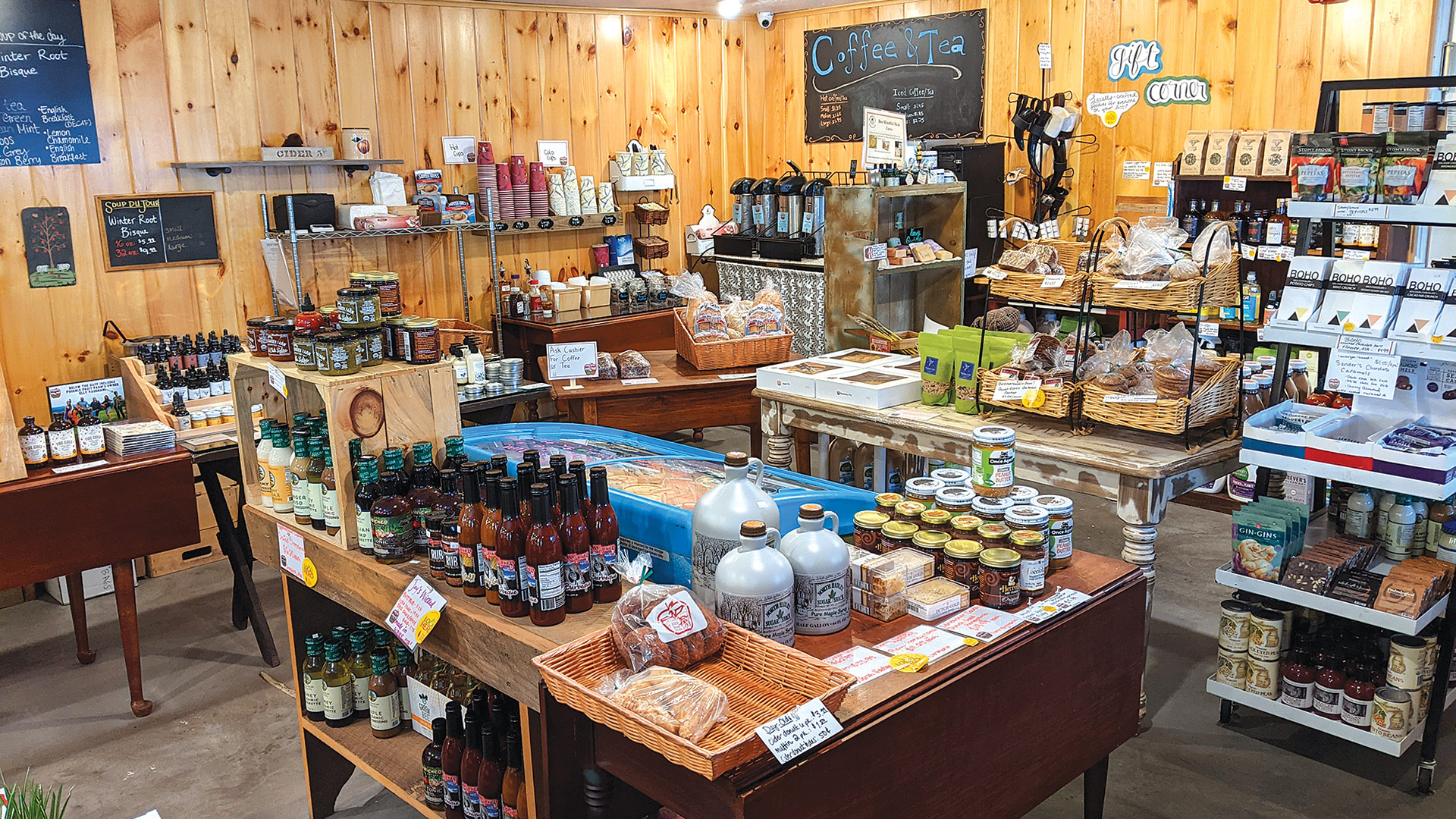
Phoenix Fruit Farm’s country store has been growing in popularity since its opening in July 2019.
“It was an effort to create a more comprehensive, one-stop grocery experience. They could get a lot of what they needed from us,” Vaughan said. “I think people really appreciated that.”
While offering an outlet for other local food producers, the country store is a critical element — along with a growing business in pick-your-own apples and peaches — in selling Phoenix’s own products directly to customers.
Vaughan wholesales apples to Big Y and a couple of smaller stores, for about $30 a bushel, because she produces too many — on more than 20 acres of apple trees — to sell on her own.
“But when I sell them in my store, I can get $50 to $60 for that same case because I’m eliminating the middleman, selling direct to the consumer, all while giving them a reasonable price point; it’s not a super expensive apple,” she explained. Direct consumer sales, in fact, are “the difference between me paying my bills and not paying my bills. As a medium to small-sized farm, it’s important to be able to market directly to people in a community-based system like this.”
Not that people should abandon the supermarket, she added. “You need to go to the supermarket for some things. You need paper towels; you need a big case of ramen noodles or whatever. But if you go to a local farmstand and get as many items as you can there instead of the store as part of your weekly or monthly routine, that makes a huge difference. And I wish people knew how much impact they can have just by including more locally oriented shopping in their routine.”
One benefit, of course, is fresher produce; while local chains like Big Y do buy from local farms, many of the fruits and vegetables they sell are not local, and, in many cases, not even in season in Massachusetts. So people are eating produce that’s been in transit for a week or two.
Switching exclusively to local produce requires some changed habits from consumers, she added, and occasionally some sacrifice.
“Part of it is people learning to eat in season and not expecting to have strawberries year-round and not expecting to have perfect, flawless-looking fruit if they want to eat organic; something grown with less chemicals is not going to look as picture-perfect,” she explained. “There needs to be somewhat of a shift with the way that people view what kind of produce they should have, and in exchange for making that shift, they can have high-quality, locally grown food that doesn’t break the bank and can support local farmers.”
While that education process is ongoing, it’s a culture that has taken root (literally and figuratively) in Western Mass. more than in many regions of the country.
“I think we are very fortunate in this community — people are really hip to local foods, and we have so much great local food in this region, and you don’t have to look very far to find everything you need to feed your family just with food produced in the Pioneer Valley,” Vaughan said. “There’s such a wealth of really great, locally produced foods around here. I’m really proud to be a part of that.”
Looking Ahead
Now in her fourth year running the farm, Vaughan has no intention of slowing down. As she waits for the first harvests from those new peach, nectarine, and pear trees and diversifies into vegetables, she’s also looking into new business opportunities, like making hard cider. For that, she’s been gathering equipment and trying to nail down the right recipe.
The store continues to grow, too. “It typically takes a few years for a business like that to optimize and settle into what it’s going to be like,” she said, adding that she also wants to expand the pick-your-own business.
“That’s another necessary piece of the business. Our fruit is the difference between being in the red and being in the black. We need direct markets through the store and pick-your-own to survive, and we’re still building those things up. Both need to continue to grow if the business will be sustainable.”
But, as evidenced by that A+ Award and, more importantly, the growing number of locals heading to Phoenix for something fresh, she’s on the right track.
“We’re not there yet,” Vaughan said. “It’s going to be a lifelong journey, shaping this place into what it’s going to be for the future.”
Joseph Bednar can be reached at [email protected]



